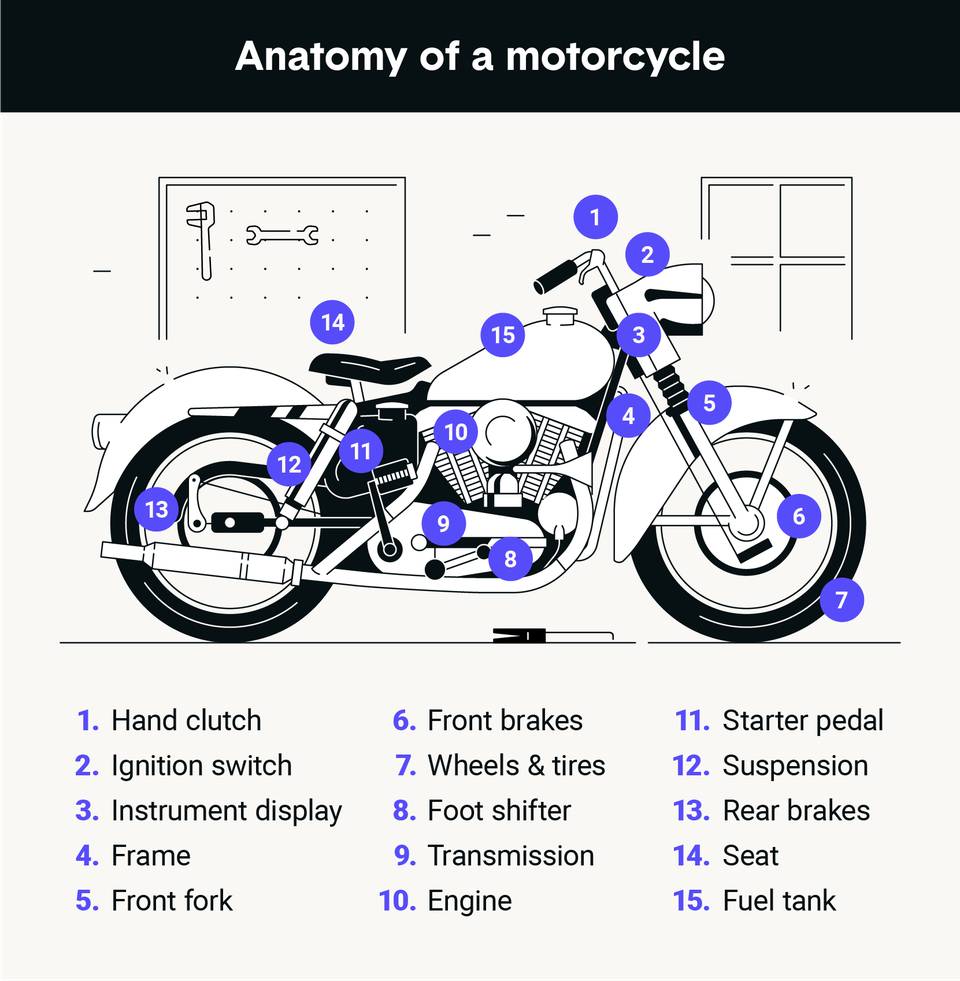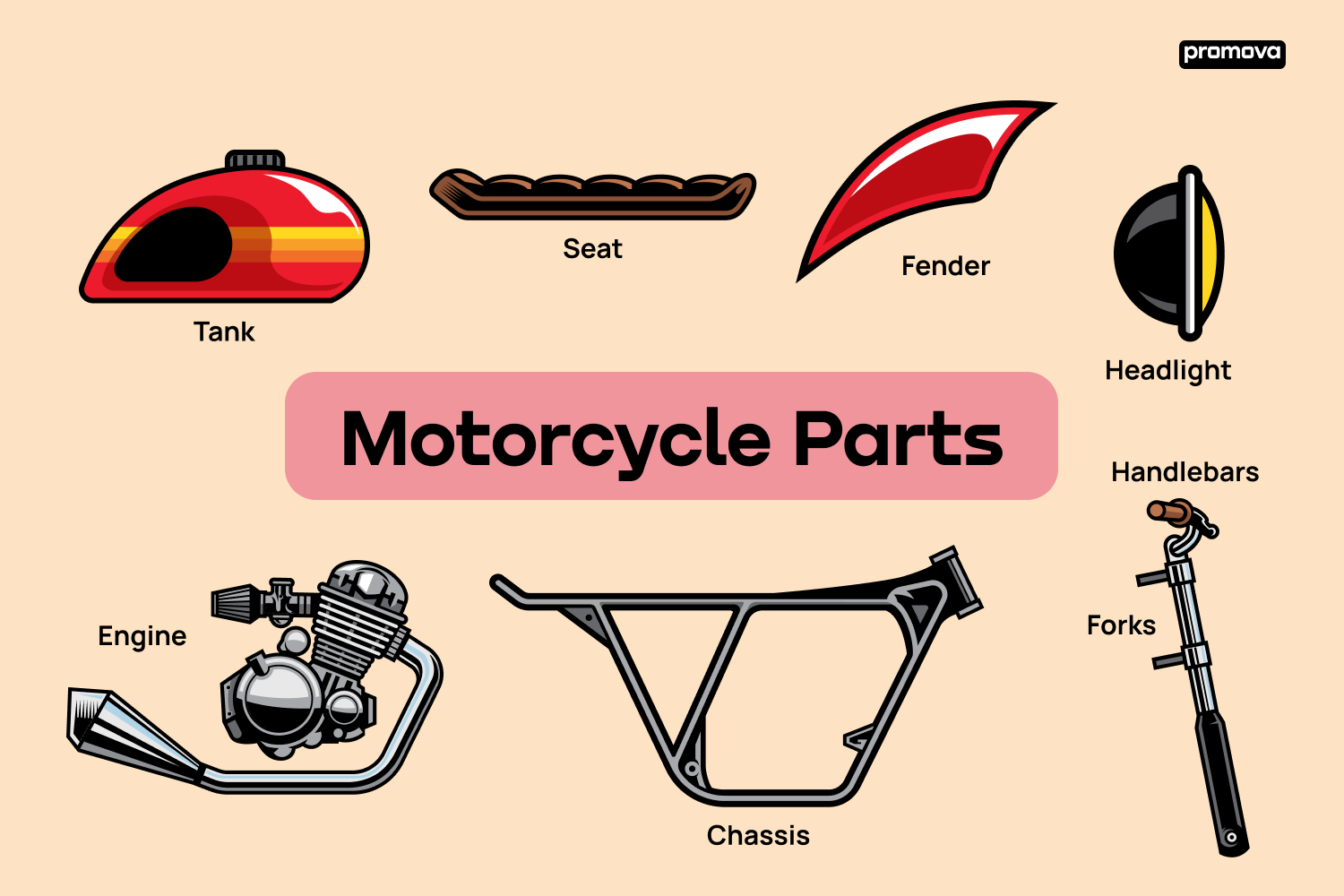A DIY Checklist for Keeping Your Motorcycle Spares Christchurch in Peak Shape
A DIY Checklist for Keeping Your Motorcycle Spares Christchurch in Peak Shape
Blog Article
Discover the Vital MotorBike Parts You Required for Optimal Performance
Comprehending the crucial parts of a motorcycle is fundamental for achieving peak efficiency. Each component, from the engine to the braking system, plays a crucial role in overall capability and security. Routine maintenance can stop unforeseen failings and improve the riding experience. However, many cyclists forget the details of these systems. Discovering how they function with each other can bring about a much more reliable experience. What important parts should every biker prioritize?
The Engine: The Heart of Your Motorbike
The engine functions as the core component of a motorbike, driving its performance and specifying its capacities. It is in charge of transforming gas into power, which powers the bike forward. Various sorts of engines are employed, including single-cylinder, V-twin, and inline arrangements, each offering distinct attributes fit for various riding designs and functions. The engine dimension, usually gauged in cubic centimeters (cc), considerably affects performance, with larger engines normally offering even more power and torque.Furthermore, the engine's style and modern technology, such as gas injection systems or air-cooling versus liquid-cooling, impact effectiveness and integrity. Upkeep is necessary for peak procedure; aspects like routine oil modifications and checking trigger connects assurance long life. Motorcyclists often consider an engine's responsiveness and smoothness, as these attributes improve the general riding experience. Inevitably, the engine remains a vital element that defines not just the motorbike's efficiency however likewise the motorcyclist's connection to the equipment.
The Transmission: Shifting Gears Smoothly
The transmission plays a vital function in a motorcycle's performance, particularly in the auto mechanics of gear shifting. Understanding just how to move gears smoothly can boost the total riding experience, while normal maintenance assurances peak capability. Proper interest to these aspects can considerably affect the durability and effectiveness of the bike.

Equipment Shifting Mechanics
Smooth equipment moving is vital for ideal motorcycle efficiency, significantly affecting both acceleration and control. The technicians of equipment changing involve the interaction between the clutch, gear bar, and transmission system. When a motorcyclist engages the clutch, it disengages the engine from the transmission, enabling an equipment modification without damaging the components. A well-timed release of the clutch, integrated with precise motion of the gear lever, helps with a smooth adjustment between equipments. This process guarantees that the engine operates within its ideal power band, improving efficiency. Bike Parts Wellington. In addition, understanding the equipment ratios and their impact on rate and torque can assist riders make informed options during shifts, inevitably contributing to an extra delightful and responsive riding experience
Upkeep Tips Value
Routine maintenance plays an important function in assuring that the transmission system operates successfully, enabling smooth gear changes. Consistently altering the transmission and examining liquid is important, as old fluid can bring about increased friction and wear. Additionally, inspecting the clutch for wear assurances peak involvement and disengagement, protecting against slippage throughout equipment changes. Lubrication of relocating parts is just as crucial to decrease friction and boost efficiency. Motorbike proprietors should also monitor for leaks and uncommon sounds, as these can indicate underlying issues. By sticking to these upkeep ideas, riders can prolong the life expectancy of their transmission system, guaranteeing that gear changes stay seamless and adding to the general performance of their motorcycle.
The Braking System: Ensuring Security on Every Experience
Braking systems are fundamental components that straight influence a motorcycle's safety and performance. They contain different components, including brake pads, blades, calipers, and hydraulic lines, all collaborating to assure efficient deceleration. The kind of stopping system-- generally either disc or drum-- impacts responsiveness and stopping power.Regular maintenance is important to promote peak performance; used brake pads can result in lowered effectiveness and increased stopping distances. In addition, the high quality of brake fluid ought to be kept an eye on, as it can soak up wetness in time, jeopardizing stopping efficiency.Riders must also consider the relevance of anti-lock stopping systems (ABDOMINAL), which protect against wheel lockup throughout abrupt stops, enhancing total security. Effectively operating brakes are not simply concerning quiting; they impart self-confidence in the rider, permitting safer navigating with different surfaces. Ultimately, a reputable braking system is vital for appreciating every trip with satisfaction.
The Suspension: Enhancing Convenience and Control
A well-functioning suspension system greatly adds to a motorcycle's total efficiency, matching the efficiency of the stopping system. The suspension plays a significant function in absorbing shocks from uneven surface areas, guaranteeing a smoother adventure while preserving tire contact with the roadway. This get in touch with is crucial for both stability and control, allowing bikers to navigate edges with confidence and precision.Different sorts of suspension systems, such as telescopic forks or mono-shocks, supply varying levels of convenience and handling. Properly tuned suspension improves responsiveness, giving the rider with a much more connected feeling to the motorcycle. Normal maintenance checks are very important to identify the suspension elements, including springs and dampers, are functioning at their best. A reliable suspension system not just elevates the riding experience yet additionally contributes to the long life of various other motorbike parts by decreasing damage. Because of this, purchasing top quality suspension is essential for any type of significant motorcycle enthusiast.
The Tires: Linking You to the Roadway
Tires play an important duty in a motorbike's performance, working as the primary web link between the rider and the roadway. Understanding the different kinds of tires readily available can considerably affect handling and security. Additionally, regular upkeep is essential to guarantee peak tire performance and longevity.
Tire Enters Explained
Just how do different tire types influence a motorbike's performance? Tire types play an important function in establishing a motorcycle's grip, stability, and handling. Sport tires, developed for high efficiency, offer improved traction and responsiveness on paved roadways, making them ideal for competing and hostile riding. Alternatively, touring tires focus on resilience and convenience, supplying a smoother experience for long-distance traveling. Off-road tires, characterized by their rugged walk patterns, master traction on unpaved surface areas, suitable for adventure fanatics. Additionally, dual-sport tires mix attributes from both off-road and on-road classifications, satisfying flexible riding demands. Ultimately, picking the appropriate tire type is important for maximizing efficiency, guaranteeing security, and boosting the overall riding experience.
Maintenance Tips Offered
While riding when traveling, maintaining excellent tire problem is important for safety and performance. Consistently checking tire stress is necessary, as under-inflated tires can result in bad handling and raised wear. It is a good idea to check tread deepness often; worn tires compromise grasp and security. In enhancement, bikers should try to find indicators of damage, such as lumps or cracks, which can suggest the demand for replacement. Revolving tires occasionally ensures even use, enhancing long life. Furthermore, keeping tires clean from particles and staying clear of excessive visuals can prolong their life expectancy. Lastly, preserving correct alignment and balance adds to peak performance, lessening tension on other bike parts. Sticking to these upkeep tips will considerably improve the total riding experience.
The Gas System: Sustaining Efficiency and Efficiency
The fuel system plays an important role in making the most of a motorcycle's performance and effectiveness, as it assures the optimum delivery of gas to the engine. It makes up a number of essential parts, consisting of the fuel container, fuel pump, gas filter, and fuel injectors or carburetor. Each part must operate properly to assure a powerful and smooth ride.The fuel tank shops fuel and supplies it to the engine via the fuel pump, which produces the essential stress. A gas filter protects against pollutants from entering the engine, while the injectors or carburetor mix gas with air for combustion.Proper maintenance of the fuel system is important; a blocked filter or malfunctioning injector can cause decreased efficiency and enhanced fuel usage. By verifying that the gas system runs efficiently, motorcyclists can enjoy improved throttle feedback, much better fuel economic climate, and generally enhanced riding experience.
The Electrical System: Powering Your Ride
An efficient electrical system is essential for the overall functionality and safety of a motorbike, as it powers vital parts such as the ignition, lights, and various electronic systems. This system includes the battery, which shops energy, and the generator, in charge of creating power while the engine runs. The electrical wiring harness connects these components, making sure reliable power distribution.Additionally, integrates safeguard the system from overloads, while relays aid manage high-current devices with low-power signals. A properly maintained electric system boosts efficiency by guaranteeing smooth begins and consistent operation of signals and lights, important for motorcyclist visibility and safety.Regular checks of the battery's fee and links are very important for stopping electrical failings. Cyclists should additionally evaluate electrical wiring for wear and tear, making certain all elements function preferably. Eventually, a durable electrical system contributes substantially to the total efficiency and dependability of the motorbike.
Often Asked Inquiries
How Commonly Should I Replace My Bike's Battery?
The regularity of motorcycle battery substitute depends on use and maintenance (Motorcycle Spares Christchurch). Generally, batteries need to be changed every 3 to five years. Normal checks can aid identify when a substitute is needed for peak efficiency
What Tools Do I Need for Standard Bike Upkeep?
For fundamental motorcycle maintenance, one requires essential tools such as a socket collection, wrenches, screwdrivers, pliers, tire pressure scale, and a torque wrench. These devices assist in efficient maintenance and guarantee the motorcycle runs successfully and safely.
Just How Can I Boost My Motorcycle's Aerodynamics?
To improve motorcycle the rules of aerodynamics, one need to take into consideration changing fairings, making use of windshield extensions, optimizing body setting, and reducing total weight. These alterations aid lessen drag, boosting security and fuel performance throughout adventures.
What Are the Signs of a Failing Electrical System?
Indicators of a falling short electrical system include lowering lights, problem beginning, uneven instrument Motorcycle Parts Auckland analyses, and blown integrates. Motorbike Components NZ. Unusual smells or deterioration around battery terminals may likewise indicate underlying concerns requiring instant focus for security and efficiency

How Do I Choose the Right Oil for My Bike?
When choosing oil for a motorbike, one ought to consider the supplier's requirements, thickness rankings, and the kind of riding. Furthermore, artificial versus traditional oil can influence efficiency and engine defense, affecting the choice substantially. The engine size, generally measured in cubic centimeters (cc), considerably influences efficiency, with bigger engines normally providing more power and torque.Furthermore, the engine's layout and modern technology, such as fuel injection systems or air-cooling versus liquid-cooling, affect performance and dependability. A well-functioning suspension system significantly adds to a motorbike's total efficiency, complementing the performance of the stopping system. The gas system plays a crucial duty in making best use of a motorcycle's efficiency and effectiveness, as it ensures the optimum shipment of gas to the engine. A fuel filter protects against contaminants from going into the engine, while the injectors or carburetor mix fuel with air for combustion.Proper upkeep of the gas system is critical; a clogged filter or malfunctioning injector can lead to decreased efficiency and raised fuel intake. A well-kept electric system improves efficiency by guaranteeing smooth beginnings and regular operation of lights and signals, vital for cyclist exposure and safety.Regular checks of the battery's charge and links are vital for protecting against electric failures.
Report this page